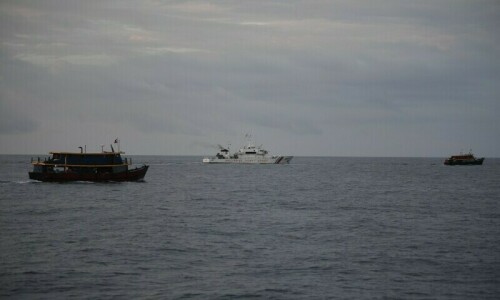For months, human traffickers beat and drugged Blessing, hauling the 27-year-old from one gold mine encampment to the next, where each night she was forced to sleep with dozens of men for less than $2 a person.
The madam who lured Blessing to the landlocked West African nation of Burkina Faso with promises of a hair salon job, threatened to kill her if she tried to run away.
“Nobody comes to your rescue,” said Blessing, wiping tears from her cheeks during a recent interview.
In December 2019, while the madam was away, Blessing finally got the courage to escape. With the help of residents, she and six other women left the encampment and walked to safety, ultimately ending up in a United Nations transit centre for migrants in the capital city of Ouagadougou.
Blessings experience in the gold mining encampments is not unique.
As part of a months-long investigation into sex trafficking and the gold mining industry, The Associated Press met with nearly 20 Nigerian women who said they had been brought to Burkina Faso under false pretences, then forced into prostitution. Some of the women, who like Blessing spoke on condition of anonymity out of fear for their safety, said they knew hundreds of others with similar stories. To protect their safety, AP is identifying the women by the names they used for sex work.
Women are bound to the madams until they pay off their debts which often approach $2,700
The AP verified the women’s stories through interviews with aid workers, lawyers, police, local anti-trafficking activists, health workers, a trafficker, and members of the Nigerian community in several towns throughout Burkina Faso.
While both Burkina Faso and Nigeria have signed the UN Convention Against Transnational Organised Crime, neither has finalised a joint plan on how to combat trafficking.
Burkina Faso’s security sector, already struggling to stem a violent insurgency, is undertrained and ill-equipped to disrupt the expansive network of recruiters, traffickers and pimps.
As a result, the country not only struggles with trafficking within its borders but has also been identified as a transfer point for trafficking women into other countries, according to reports from the US State Department.
Burkina Faso is likely to be downgraded in this year’s Trafficking in Persons Report, an annual report issued by the US State Department, according to two people familiar with the discussions who were not authorised to speak on the record. Generally, countries are downgraded if they haven’t made significant steps to curb trafficking. Downgraded countries could also risk US economic and diplomatic penalties.
Experts and local officials say most documented human trafficking cases of women appear at small-scale gold mines, not the larger industrial mines.
Salofou Trahore, general director for Burkina Faso’s regulatory body for small-scale mines, said he was unaware that women were being exploited at the sites. The government is in the process of regulating small-scale mines more strictly, he said. Mr Trahore added that this would provide better oversight of the mines, as well as tracking environmental and human rights abuses.
Prostitution exists in a legal grey area in Burkina Faso as it is not illegal, but soliciting it is. Police say it is hard to prove if someone has been trafficked into sex work because women fear retaliation from criminal networks.
The limited available figures show an increase in reported trafficking cases in recent years. The UN International Organization for Migration helped over 35 people trafficked last year in Burkina Faso, compared with 12 for all of 2018, said Claire Laroche, the organisation’s protection officer.
AP’s investigation showed the problem is far larger.
In Secaco, a makeshift mining town tucked behind uneven dirt roads deep in the brush, trafficked women live and work in tiny, ragged tents with plastic sheeting. Here they have sex on thin mattresses on the dirt floor with 30 men a night, trying to earn their freedom.
A 27-year-old called Mimi said recruiters told her she’d have a job to support her three children when she arrived in Burkina Faso. Two months later, she still owed her madam $1,200.
“It is a jungle and I want to survive,” she said.
The clients, mostly local miners or men from neighbouring Mali or Ivory Coast, often refuse to pay and become physically abusive, the women said.
Nigerian women are usually taken to the western city of Bobo-Dioulasso and sold for upward of $700 to different Nigerian madams, according to interviews with several women, a trafficker, and local authorities.
The madams confiscate the women’s passports, phones, and money, then force them into sex work in brothels in makeshift mining towns adjacent to the small-scale mines or larger towns near the mines. Few of the women speak the local language or know the area.
Boukary Ouedraogo, the police commissioner in Bobo-Dioulasso, said that on many occasions when a trafficker or madam was arrested, community leaders have tried to negotiate for their release, which points to complicity within the Nigerian community, he said.
Women are bound to the madams until they pay off their debts which often approach $2,700. Madams often threaten to kill them with juju, a form of witchcraft, if they try to escape.
Some of the women were recruited by the madams themselves, approached randomly on a bus or in the market in Nigeria, and asked if they wanted to earn a better living. Others were referred by friends or acquaintances, usually, young boys paid to recruit women.
Once recruited, the women travel for approximately three days with the traffickers. The typical route is through Cotonou, a large port city in Benin, and then north, sometimes passing through Togo, into Burkina Faso.
Human trafficking experts said abuses will continue until the mining industry including buyers atop the supply chain, such as jewellers and electronics makers take responsibility for where the gold originates. There is a lot of focus on conflict minerals, but people have to be aware that gold is also being produced in a context of exploitation. People are being bought and sold, which is basically putting a price tag on a person.
Meanwhile, the women whose lives have been upended are pleading with the traffickers to stop.
Blessing wants to start a business selling sugar and flour with her mother in Nigeria, where she has returned. She knows others have lost hope.
Many girls had good dreams of becoming something meaningful in life. (The traffickers) use this stuff to damage their thinking, to damage their hopes, she said.
Published in Dawn, The Business and Finance Weekly, May 3rd, 2021














































Dear visitor, the comments section is undergoing an overhaul and will return soon.